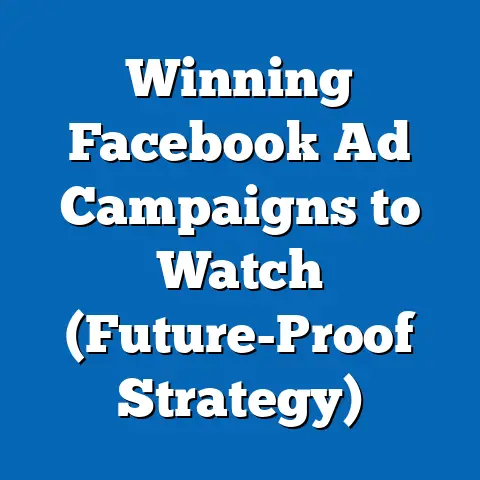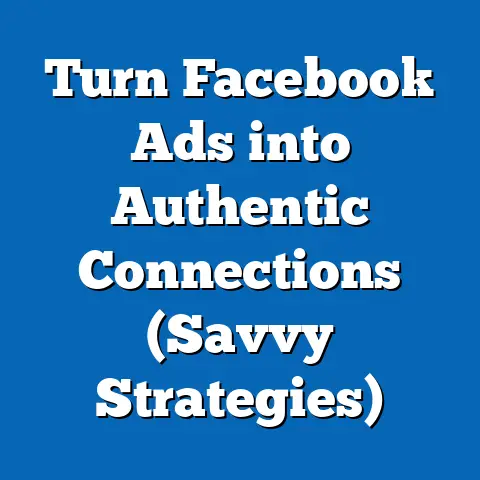Master Disabling Facebook Ads (Pro Tips for Privacy)
In an era where personal data is often referred to as the “new oil,” one of the most common mistakes individuals make is underestimating the extent to which their online activities are tracked and monetized.
Many users of social media platforms like Facebook casually scroll through their feeds, unaware that every click, like, and share contributes to a detailed digital profile used to target them with personalized advertisements.
This oversight is not merely a personal misstep; it reflects a broader societal gap in understanding digital privacy and the mechanisms behind ad-driven ecosystems.
This mistake stems from a lack of awareness about how platforms like Facebook operate.
Users often assume that their data remains private or that the ads they see are random, when in reality, these ads are the result of sophisticated algorithms analyzing vast amounts of personal information.
The implications of this ignorance are profound, ranging from unwanted exposure to manipulative marketing tactics to potential risks of data breaches and identity theft.
Section 1: Understanding Facebook Ads and the Privacy Problem
The Mechanics of Facebook Advertising
Facebook, now under the umbrella of Meta, is one of the largest advertising platforms in the world, generating billions of dollars annually through targeted ads.
The platform collects an immense volume of user data, including demographic information, browsing history, location data, and even interactions outside the app through tracking pixels embedded on third-party websites.
This data is then used to create highly personalized ads tailored to individual preferences, behaviors, and interests.
The average user may not realize the depth of this tracking.
For instance, even if you’ve never explicitly shared certain information, Facebook can infer details about your life—such as your political leanings or purchasing habits—based on your activity and the behavior of your social network.
According to a 2021 report by the Pew Research Center, 74% of Americans feel uncomfortable with the amount of personal information social media companies hold about them, yet many continue to use these platforms without taking protective measures.
Historical Context: The Rise of Digital Surveillance
The issue of digital privacy is not new, but it has evolved dramatically over the past two decades.
In the early 2000s, the internet was still seen as a frontier of freedom and anonymity, with limited understanding of how data could be weaponized for profit.
The launch of Facebook in 2004 marked a turning point, as social media began to shift the internet from a space of exploration to one of constant connectivity and data collection.
Significant events like the 2018 Cambridge Analytica scandal—where data from millions of Facebook users was harvested without consent for political advertising—brought digital privacy into the public spotlight.
This incident revealed how user data could be exploited beyond mere commercial purposes, influencing elections and shaping public opinion.
Historically, each privacy scandal has spurred temporary outrage, but sustained behavioral change among users remains elusive, highlighting a persistent societal blind spot.
Societal Implications of Unchecked Data Collection
The societal consequences of unchecked data collection are far-reaching.
On an individual level, constant exposure to targeted ads can lead to overconsumption, psychological manipulation, and even addiction to social media platforms designed to keep users engaged.
On a broader scale, the aggregation of personal data by tech giants raises concerns about power imbalances, where corporations wield disproportionate influence over public discourse and individual behavior.
Moreover, the erosion of privacy contributes to a culture of surveillance, where individuals self-censor or alter their behavior out of fear of being watched or judged.
A 2019 study by the Electronic Frontier Foundation (EFF) found that 62% of internet users have modified their online activity due to privacy concerns, indicating a chilling effect on free expression.
This dynamic disproportionately affects younger generations, who have grown up in a world of pervasive digital tracking, often with less skepticism about sharing personal information.
Section 2: Generational Perspectives on Digital Privacy
Defining Generational Cohorts and Their Digital Experiences
Generational differences play a significant role in how individuals perceive and respond to digital privacy concerns.
Baby Boomers (born 1946–1964), who came of age before the internet, often approach technology with caution, valuing privacy but sometimes lacking the technical know-how to protect themselves online.
Generation X (born 1965–1980), often described as the “bridge” generation, witnessed the rise of the internet in their formative years and tends to balance a desire for connectivity with an awareness of privacy risks.
Millennials (born 1981–1996) and Generation Z (born 1997–2012), on the other hand, are digital natives who have grown up with social media as a central part of their lives.
While Millennials often grapple with the tension between oversharing and privacy concerns, Gen Z exhibits a paradoxical mix of tech-savviness and resignation to surveillance, with many accepting data collection as an inevitable trade-off for free services.
According to a 2022 survey by Deloitte, 67% of Gen Z users express concern about data privacy, yet only 30% actively take steps to limit tracking.
Historical Events Shaping Generational Attitudes
Each generation’s attitude toward privacy has been shaped by the historical and technological context of their time.
For Baby Boomers, the Cold War era instilled a deep-seated wariness of surveillance, whether by governments or corporations.
Gen Xers, who experienced the dot-com boom and early internet forums, often retain a sense of nostalgia for a less invasive online world, coupled with skepticism toward Big Tech.
Millennials came of age during the rapid expansion of social media, experiencing firsthand the transition from MySpace to Facebook and the subsequent data scandals.
Gen Z, meanwhile, has never known a world without smartphones or constant connectivity, with events like the Snowden leaks in 2013 reinforcing the idea that privacy is a myth in the digital age.
These formative experiences create distinct lenses through which each generation views the trade-offs of technology.
Nuances Within Generational Trends
It’s critical to avoid overgeneralizations when discussing generational attitudes.
Within each cohort, factors like socioeconomic status, education, and cultural background influence how individuals approach privacy.
For instance, a tech-savvy Boomer with a background in IT may be more proactive about disabling ads than a Gen Z user who prioritizes convenience over control.
Acknowledging this diversity ensures a more accurate understanding of privacy behaviors across age groups.
Section 3: Pro Tips for Disabling Facebook Ads and Protecting Privacy
Step 1: Understanding Your Data Settings
The first step to regaining control over your privacy on Facebook is to explore the platform’s data settings.
Navigate to the “Settings & Privacy” menu, then select “Privacy Shortcuts” to review what information Facebook collects about you.
Under “Ad Preferences,” you can see the categories and interests Facebook has assigned to you based on your activity, often revealing startlingly specific details about your inferred preferences.
While you cannot completely stop Facebook from collecting data, you can limit how it’s used for advertising.
Disable options like “Ads Based on Data from Partners” and “Ads Based on Your Activity on Facebook Company Products” to reduce the scope of targeted ads.
Keep in mind that these settings don’t eliminate ads entirely—they only make them less personalized.
Step 2: Adjusting Ad Personalization Settings
Beyond basic data settings, delve into the “Ad Settings” section to further restrict ad personalization.
Turn off “Ads That Include Your Social Actions,” which prevents your likes and interactions from being used to promote products to your friends.
Additionally, opt out of “Interest-Based Ads” to minimize the use of inferred data in ad targeting.
According to privacy expert Dr. Ann Cavoukian, creator of the “Privacy by Design” framework, users should treat these settings as a starting point rather than a complete solution.
Regularly revisiting and updating your preferences is crucial, as platform policies and features often change without explicit notification.
Step 3: Limiting Off-Facebook Activity Tracking
One of Facebook’s lesser-known tracking mechanisms is “Off-Facebook Activity,” which monitors your behavior on other websites and apps through tracking pixels and cookies.
To disable this, go to “Settings,” select “Your Facebook Information,” and click on “Off-Facebook Activity.” From there, you can clear your history and disconnect future activity from your account.
This step is particularly impactful because it addresses the broader ecosystem of data collection beyond the platform itself.
A 2020 study by Consumer Reports found that 85% of users were unaware of off-platform tracking, underscoring the need for greater transparency and user education.
Step 4: Using Third-Party Tools for Enhanced Privacy
For those seeking additional protection, third-party tools like browser extensions (e.g., uBlock Origin, Privacy Badger) can block trackers and ads across the web, including on Facebook.
Virtual Private Networks (VPNs) can also mask your IP address, making it harder for the platform to track your location.
Be cautious when selecting tools, however, as some free services may compromise your data in other ways.
Privacy advocates recommend combining these tools with mindful online behavior, such as avoiding unnecessary logins with Facebook credentials on third-party sites.
As cybersecurity expert Bruce Schneier notes, “Privacy is a process, not a product,” emphasizing the importance of sustained vigilance.
Step 5: Considering Account Deletion or Minimal Use
For users deeply concerned about privacy, the most drastic but effective option is to delete or deactivate their Facebook account.
Deletion removes your data from the platform’s servers (though backups may persist for a limited time), while deactivation temporarily hides your profile.
If deletion isn’t feasible, minimize usage by logging out after each session and avoiding the app on mobile devices, where tracking is more pervasive.
This decision often depends on personal and professional needs, as many rely on Facebook for networking or community engagement.
Weighing the benefits against the privacy risks is a deeply individual choice, but one worth considering in light of recurring data scandals.
Section 4: Broader Implications of Ad Tracking and Privacy Practices
Economic Factors: The Business Model of Free Platforms
Facebook’s ad-driven model is emblematic of the broader “attention economy,” where user engagement translates directly into revenue.
The platform offers free access in exchange for data, a trade-off that many users accept without fully understanding its implications.
This economic structure incentivizes constant data collection, as more detailed profiles enable more effective—and lucrative—ad targeting.
Critics argue that this model creates a power asymmetry, where users have little bargaining power over how their data is used.
A 2022 report by the World Economic Forum highlighted that the global data economy is valued at over $3 trillion, with social media platforms as key players.
Disabling ads or opting out of tracking challenges this system, but it also raises questions about the sustainability of free services without alternative revenue streams.
Social and Cultural Shifts: The Normalization of Surveillance
Culturally, the pervasive nature of ad tracking has normalized surveillance in ways that previous generations might have found unthinkable.
Younger users, in particular, often view data collection as an inevitable part of digital life, a mindset reinforced by the seamless integration of technology into daily routines.
This resignation can hinder collective action for stronger privacy protections, as apathy replaces outrage.
At the same time, there is a growing counter-movement advocating for digital rights and data sovereignty.
Initiatives like the European Union’s General Data Protection Regulation (GDPR), implemented in 2018, represent a pushback against unchecked data collection, offering users greater control over their information.
The cultural tension between convenience and privacy remains a defining issue of the digital age.
Workplace Implications: Privacy in Professional Contexts
In professional settings, the intersection of personal data and workplace dynamics adds another layer of complexity.
Many employees use Facebook for networking or professional groups, often unaware that their activity could influence how they’re perceived by employers or colleagues.
Targeted ads based on workplace-related searches can also blur the line between personal and professional spheres.
Organizations, too, must navigate privacy concerns, as employees increasingly demand transparency about how their data is handled on corporate social media accounts.
HR professionals and privacy consultants recommend clear policies on social media use, coupled with education on managing personal privacy settings to mitigate risks.
Section 5: Comparative Analysis of Privacy Across Platforms
Facebook vs. Other Social Media Giants
While Facebook is often the focal point of privacy discussions, it’s worth comparing its practices to those of other platforms like Twitter (now X), Instagram (also under Meta), and TikTok.
Instagram, for instance, mirrors Facebook’s ad targeting capabilities due to shared infrastructure, though its younger user base may be less aware of these mechanisms.
TikTok, meanwhile, has faced scrutiny for its data collection practices, particularly concerning ties to the Chinese government, raising unique geopolitical privacy concerns.
Twitter/X operates on a slightly different model, with less emphasis on personal data for ads and more on real-time trends, though tracking still occurs.
A 2021 analysis by the Norwegian Consumer Council found that all major platforms engage in invasive data collection, with variations in transparency and user control.
This comparison underscores that privacy challenges are systemic, not unique to Facebook, necessitating a broader approach to digital literacy.
Lessons from Other Industries
Beyond social media, industries like e-commerce and search engines offer lessons for managing privacy.
Google, for instance, provides robust tools for opting out of personalized ads, though complete anonymity remains elusive.
E-commerce platforms like Amazon track purchasing behavior with precision, often linking data to social media profiles for cross-platform targeting.
These parallels suggest that privacy solutions must be cross-sectoral, addressing the interconnected nature of digital ecosystems.
Experts advocate for universal standards, such as those proposed in the GDPR, to create a baseline of protection regardless of platform or industry.
Section 6: Forward-Looking Insights and Uncertainties
The Future of Digital Privacy
Looking ahead, the trajectory of digital privacy remains uncertain, shaped by technological innovation, regulatory developments, and shifting user attitudes.
Emerging technologies like artificial intelligence and blockchain could either exacerbate privacy concerns or offer new solutions, depending on their implementation.
AI-driven ad targeting, for instance, promises even greater personalization, while blockchain-based identity systems could empower users to control their data.
Regulatory efforts are also gaining momentum, with proposals for stricter data protection laws in regions like the United States, where privacy legislation lags behind Europe.
However, enforcement challenges and lobbying by tech giants pose significant hurdles.
As noted by privacy scholar Shoshana Zuboff, author of The Age of Surveillance Capitalism, systemic change requires a reimagining of the relationship between users, platforms, and regulators.
Generational Shifts and Cultural Evolution
Generational dynamics will continue to influence privacy norms, with Gen Z and the emerging Generation Alpha (born after 2012) likely to demand greater transparency as digital natives.
At the same time, their comfort with technology may perpetuate a culture of oversharing unless education and advocacy intervene.
Balancing innovation with ethical data practices will be a defining challenge for future cohorts.
Older generations, meanwhile, may play a critical role in advocating for privacy, drawing on historical skepticism of surveillance to push for systemic reforms.
Cross-generational dialogue could foster a more unified approach to digital rights, bridging the gap between tech-savvy youth and cautious elders.
Uncertainties in the Digital Landscape
Despite these trends, uncertainties abound.
Will public pressure lead to meaningful change in tech companies’ business models, or will profit motives prevail?
How will global disparities in privacy laws affect users in less-regulated regions?
And what role will individual agency play in a landscape dominated by corporate interests?
These questions highlight the complexity of the issue, with no easy answers on the horizon.
Conclusion: Empowering Users in the Age of Surveillance
Mastering the art of disabling Facebook ads is more than a technical skill—it’s a statement of agency in an era of pervasive surveillance.
By understanding the platform’s data collection mechanisms, leveraging privacy settings, and adopting broader protective measures, users can reclaim a measure of control over their digital lives.
Yet, individual action alone is insufficient; systemic change requires collective advocacy, regulatory reform, and a cultural shift toward valuing privacy as a fundamental right.
The societal implications of unchecked ad tracking are profound, influencing everything from personal behavior to democratic processes.
Generational differences add nuance to this issue, as each cohort navigates the digital landscape with unique perspectives shaped by history and technology.
As we look to the future, the balance between innovation and ethics remains precarious, but informed users equipped with pro tips for privacy can lead the charge toward a more equitable digital world.
Ultimately, the journey to protect privacy is ongoing, requiring vigilance, education, and a willingness to challenge the status quo.
While uncertainties persist, the power to shape the future of digital privacy lies in the hands of individuals, communities, and policymakers willing to act.
Let this be a call to action—to not only disable ads but to enable a culture of empowerment and accountability in the digital age.






